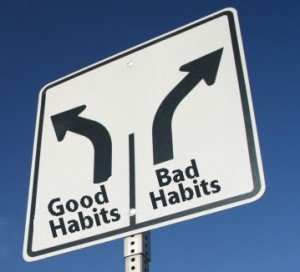
It’s a mistake to look for ‘the techniques’ to make you break a bad habit—drinking, overeating, or whatever it is.
There’s an error in asking the question, ‘What steps can I take to break my habit?’ The question implies that a series of steps are more fundamental—or can somehow replace—a commitment to make a change.
The commitment to making a change is everything. It’s the commitment that enables you to say, ‘I will engage in this or that technique, because I’m committed to changing.’
For example, someone trying to quit drinking might find it helpful to avoid hanging out with people who drink a lot. Or someone trying to quit smoking might find it helpful to utilize a nicotine patch to phase out smoking.
It’s not a question of whether such techniques work, although they certainly might for many. It is really a question of whether you’re committed to quitting, or not.
Commitment to change is similar to honoring a principle. Principle is sometimes what’s referred to as what you do when nobody else is looking. Commitment to breaking a bad habit is like that. It’s the thing that leads you to say to yourself, ‘Even though I really feel like doing this, I won’t because of the commitment I have to making this change.’
A ‘bad’ habit refers to something that is, in fact, objectively bad; and something you have chosen—for your own sake most of all—to change. This is why many attempts to break a bad habit fail. Often unknowingly, people are motivated to make these changes because of empty ‘shoulds” (i.e., shoulds without reasons), or the opinions of others. For example, ‘Yes I know smoking is bad. I should stop.’ Yes, but’have you really thought out why you’re making a commitment to this life-changing event, why you’re doing it now, and why you’re doing it for your own sake, most of all? It’s so important to ‘root out’ any improper or insufficient motivations, such as, ‘I’m really doing this because someone is pressuring me.’ Before making a commitment, it’s important to understand precisely why you’re doing this, so you can keep it in mind as you go through the endeavor of making the change.
We hear a lot about addiction. We’re supposed to regard it as no different from a medical disease, something with a progression of symptoms outside of your control, which only some externalized treatment can alter.
The truth is a lot closer to what Jack Trimpey, who founded Rational Recovery, has to say on the subject. Consider his quote, and apply it not only to alcohol, but to any bad habit over which you might otherwise feel powerless:
Addiction is a voluntary behavior (such as drinking alcohol or using drugs) that persists against your own better judgment. Thus, addiction cannot be ‘diagnosed’ or attributed to you by others, including physicians. It is solely up to you to decide if your drinking threatens or harms others and yourself. You must decide now whether continuing your addictive pleasures is worth the destruction that will likely result. In other words, you are free to choose between drinking and not drinking — between the high life and family life, between right and wrong.
If you believe there is nothing wrong with your own drinking/using, then you are free to continue, provided you are willing to accept the likely consequences. If you suspect you have a problem with alcohol and other drugs, however, you probably do have a problem, and you would be very wise to learn how to summarily quit your addiction altogether.
Rational Recovery has some interesting techniques which essentially boil down to cognitive psychotherapy, i.e., recognizing and talking back to / acting against your inner, mistaken or irrational ‘self-talk.’ Again, none of these techniques are of any use to you without a full, one-hundred percent commitment to making a course correction in some aspect of your life (drinking or any other area).
Trimpey is correct. Addiction, or any other erroneous or excessive behavior, is a voluntary activity. The proof of this fact is that nobody can say or do anything ‘to’ you to make you stop. You can be convinced to stop or change, but you’re still the only one with yourself 24/7. If you’ve stopped doing something, it’s because you have stopped it. This is not merely opinion; it’s a directly observable fact. It doesn’t mean you must or even can do it alone, or without external guidance or direction. But with or without that direction, it’s still only you who can stop, start or otherwise change any given behavior.
It’s not mean or cruel to look at it this way. It’s liberating. For one thing, it’s the truth and easily proven, as I just did. The truth always sets you free, because working within the framework of objective reality is the only way to get anything done. Wishes and self-deception will never assist in change or growth. For another thing, once you accept that your mistaken behavior is voluntary, the implication is there: You do have the power to change. You are not powerless over anything, not anything that involves voluntary choice on your part. As with alcohol over-consumption, so too with anything else you seek to change.
It all starts and progresses with commitment.
Be sure to “friend” Dr. Hurd on Facebook. Search under “Michael Hurd” (Rehoboth Beach DE). Get up-to-the-minute postings, recommended articles and links, and engage in back-and-forth discussion with Dr. Hurd on topics of interest.
